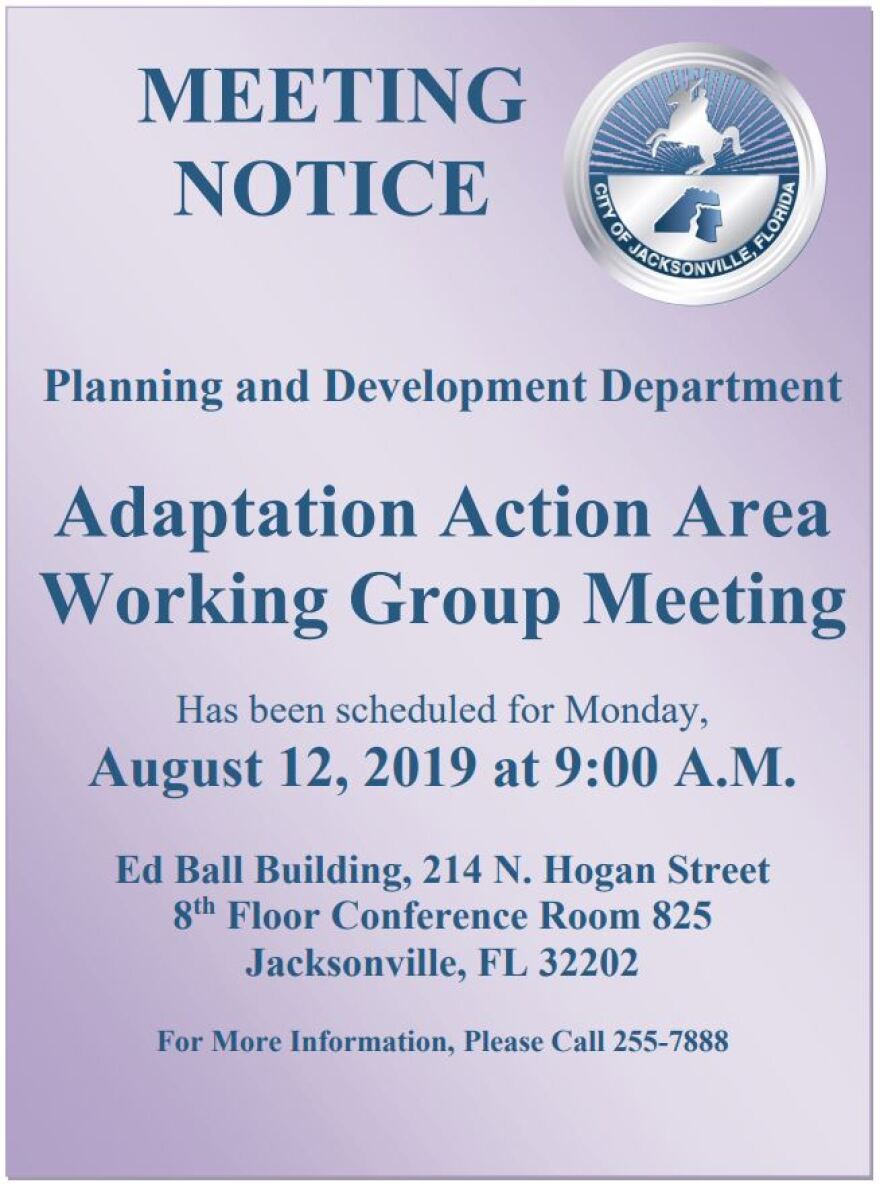After several months, Jacksonville’s sea level rise task force plans to wrap up its work by the end of August.
The end product, a list of recommendations to make the River City more resilient, will then go before the City Council for approval.
Early on, members of the Adaptation Action Area (AAA) Working Group individually submitted recommendations that they thought should be considered as part of the process. All of those recommendations were then compiled into a single document that the committee is referring to as the Adaptation Planning Framework Worksheet.
Click here to view this document in full screen mode
Over the past several meetings, members have been discussing and voting on the recommendations in that worksheet, which is 25 pages long in its current form. Members have so far voted in favor of all items up to the “Accommodation” section on page 14, which includes recommendations that the City:
- Create a high-ranking position or establish an independent agency/authority to focus on resiliency efforts.
- Educate, inform and disclose flood hazards to the public.
- Promote and participate in the implementation of green infrastructure solutions to mitigate flooding.
- Conduct a coastal flooding and sea level rise vulnerability assessment.
- Analyze the conditions before and during Hurricane Irma and the area affected by flooding from the storm.
- Work with the North Florida Transportation Planning Organization, the Jacksonville Transportation Authority and the Florida Department of Transportation to mitigate flood hazards that may occur on adjacent properties because of elevating or elevated roadways.
- Evaluate and revise land development regulations to encourage and increase protection strategies for new development and redevelopment of properties.
- Assess and compare hard structural options like sea walls and soft structural options like living shorelines and dune or wetland restoration.
- Prioritize the repair, maintenance and improvement of drainage infrastructure based on their location, the historical significance of the area and the frequency of nuisance flooding in the area.
Members also voted to change the AAA boundaries for a second time.
Related: Jacksonville Sea Level Rise Task Force Votes To Expand Area Of Focus
“The committee wanted a boundary that could be regularly updated, that made sense and ideally didn't create a financial burden to update,” said Jacksonville Director of Planning and Development Bill Killingsworth, a member of the AAA Working Group. “So what they ended up settling on is the Cat 3 storm surge boundary, which we get from the state, and then the 500-year floodplain, where those two areas intersect.”

Members had previously voted to make the AAA boundary everything that falls within the Cat 3 storm surge boundary or the 500-year floodplain.

He expects the committee to finish going through the worksheet in their next meeting on August 12. During the committee’s anticipated final meeting, scheduled for August 26, members will review a draft of the recommendation package they’ll be submitting to City Council.
“What they're voting [on] right now really is kind of tentative approval, and then at the last meeting we’ll give them the whole document, and they'll make a recommendation on the document as a whole,” Killingsworth said.
“We’ll present that draft language to Councill. I expect there’ll be some debate, maybe some amendments to some of it, and then they will adopt to transmit that to the state. The state will provide us comments and then we'll bring it back to the council for adoption,” he explained. “Assuming that the council gives a resolution of support for these recommendations, we’ll take these recommendations, and just add it to the comp plan.”
The state requires all counties and municipalities to adopt comprehensive plans, commonly referred to as comp plans, to guide future growth and development. Jacksonville is currently working on its 2030 comp plan, which includes sections that address conservation coastal management, future land use, historic preservation, housing, infrastructure, public school facilities, transportation and recreation and open space, among other things.
Community information meetings are required for proposed changes to the comp plan and Killingsworth said the City will likely host workshops on top of that. All AAA Working Group meetings are open to the public.
“I encourage them to continue to do their work and when everything is concluded we’ll assess it,” Mayor Lenny Curry said of the committee. “We know that sea level rise is happening and so the City is committed to mitigating that issue and making sure that we protect our city and that we protect the people of Jacksonville.”
Brendan Rivers can be reached at brivers@wjct.org, 904-358-6396 or on Twitter at @BrendanRivers.





